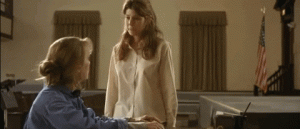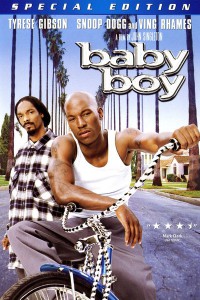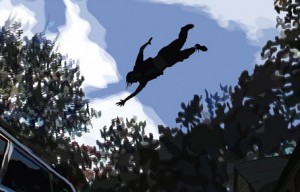Part of a roundtable discussion with David Edelstein, Roger Ebert, Sarah Kerr, and A.O. Scott in Slate, December 26, 2001. Sorry that I can’t furnish the post from David that led to it. Note: let your cursor hit the first illustration below. — J. R.
Dear David (and Roger, Sarah, and Tony),
I appreciate your evocation of Sept. 11 at the start of your letter — a defining moment for us all — as well as your conflicted thoughts about vigilantism, and how these impact on your movie tastes. For me, there’s no conflict of this kind, because I’m afraid revenge strikes me as something less than an adult aspiration or concern — accounting both for why I think Mandela’s South Africa is far ahead of the United States in this respect and why In the Bedroom, a very well-made film, doesn’t interest me much. (The only moment I recall making my pulse race was when Spacek slapped Tomei.) As you’re the first to point out, Osama Bin Laden is also obsessed with vengeance — though surely not just for “slights against his brand of Islam.” Other beefs might include the deaths of about a million innocent Iraqis (the American Friends Service Committee’s estimate last spring) — collateral damage that Madeleine Albright told us she had no regrets about, despite the fact that it arguably only strengthened Saddam Hussein — as well as many other lethal forms of meddling in the Middle East, some of them slights against both humanity and common sense. But I hasten to agree with you: “we’re all pretty vulnerable this year” — even more so if one extends that “we” to Afghans (or simply to the non-Americans killed on 9/11).
I share your enthusiasm for items No. 2, No. 3, No. 4, No. 6, and No. 9 on your list, as well as Waking Life, The Circle, The Pledge, and Baby Boy among your runners-up — and that’s not even counting the certifiable if less enduring pleasures I found in The Lord of the Rings, Amores Perros, Va Savoir, and The Tailor of Panama, and the nine contenders you mentioned that I haven’t seen (Shallow Hal, Together, Intimacy, No Man’s Land, The Claim, Iris, Piñero, Monster’s Ball, Black Hawk Down). So, we have lots of agreements — including your preference for Waking Life’s images and sounds over its dialogue (as argued in your original review), and your suspicion that the new Altman may be his best since the ‘70s. But disagreements are probably more enjoyable to read about, so let me turn to A.I.
What you’re rightly calling “the plangent, stuck-record yearning of its protagonist” is actually identical to what Freud called the Oedipus complex and, rightly or wrongly, regarded as the human condition. The fact that you’re attributing this condition to a machine is the troubling conundrum that Kubrick and Spielberg have imparted to us. Talk about revenge: A screwed-up scientist (William Hurt) yearning for his own lost child creates a substitute who is cursed with the same psychic disability as himself and the rest of humanity. Ergo, a robot achieves his own ultimate wish by going to bed with a clone of the woman he was programmed to love, thereby fulfilling the ideal scenarios of Spielbergian suburban bliss and Kubrickian rebirth (a reversal of the end of 2001 — instead of the human becoming superhuman, the superhuman who outlasts humanity finally becomes human by going to sleep and dreaming.
It’s entirely possible that Spielberg and Kubrick have greater faith in machines than in humanity — above all, in the machine known as cinema — but what’s human about these machines is what interests them the most, forming the basis of their common misanthropy and their soured idealism. The issues of A.I. are posed every time we look at a movie and persuade ourselves we’re watching people and not a thing. Another version of that conundrum is posed by Waking Life, my other favorite of 2001 — a film that redefines place and personality with a comparable set of paradoxes.
In closing, let me add to your tribute to Pauline Kael a few words of both measured agreement and gratitude. I was a Paulinista myself when it came to learning about the dynamics of passionate and personal critical prose in my late teens and early 20s, when her example had the strongest effect on me. I ceased to be one about a decade later after being repeatedly told — correctly or incorrectly — by people who knew her that I could never hope to be friends with her because of the critical things I wrote about some of her arguments. These were polemical sorties that I’d (rightly or wrongly) assumed she would take to be in her own spirit. That’s why I’m deeply grateful to you for saying I was someone “whose writing she frequently admired” — something I’ve never heard before now.
All the best,
Jonathan









